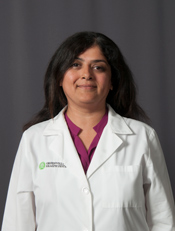About
Dr. Garimella is an Assistant Professor of Pediatrics specializing in Pediatric Nephrology, and the medical director of the Division of Pediatric Nephrology and Hypertension, and a clinical assistant professor of pediatrics at the UofSC School of Medicine Greenville. She trained in pediatrics as well as nephrology at State University at New York, Buffalo (UB). She remained on staff at Children’s Hospital, Buffalo for nine years, while maintaining her academic appointment at UB conducting research, teaching medical students, residents and fellows. Her research interests include hypertension particularly in obese children. Her current interest lies in the use of ambulatory blood pressure to predict target organ damage in this population. She is also involved in AHRQ funded study aimed at improving identification of hypertension in children (BP-CATCH). Her previous work involved projects looking at microalbumin excretion and markers like MicroRNA in obese children and the potential to predict hypertension early; and the use of Doppler studies in obese hypertensive children. She was part of a Communities of Excellence group at UB looking to develop novel technologies for use in obese patients. Her work has been regularly presented at national conferences [Society for Pediatric Research, American Society for Pediatric Nephrology (ASPN) and American Society of Nephrology]. She also conducts clinical trials related to Chronic Kidney Disease in children through national clinical trial consortiums (NAPRTCS). Another research interest is in developing simulation technologies to improve resident /fellow training in procedures, collaborating with engineers/roboticists. She received funding from UB for SimBiopsies, a project utilizing haptics to quantify progress in training. She also actively advocates for her patients through NKF and has held committee leadership positions at ASPN.
How their research is transforming health care
Childhood obesity is a significant problem all over the world, and is at epidemic proportions in the United States. Diseases that are exacerbated by obesity are becoming more prevalent and consume a greater proportion of valuable resources and health care dollars. Pediatricians have a unique responsibility in this regard. Identifying and treating childhood obesity and hypertension will be of great benefit not only to the individual but to society at large. Obese children grow into obese adults. Chronic kidney disease (CKD) burden increases with obesity and developing markers for CKD in childhood should help identify problems early. Ambulatory blood pressure monitoring is of great value in identifying early signs of dysregulation of blood pressures. Microalbuminuria can be an early marker not only of diabetes but hypertension. Developing a panel of tests for obese children should enable stratification into high risk or otherwise. Strategies and resources can be targeted toward the high-risk children increasing chances of disease burden reduction at population level. Identifying novel ways to impart education especially surrounding procedure training will help develop skills for the healthcare workforce of the future. She is interested in techniques that leverage technology/simulation to demonstrate progress in learning for trainees. Quantification of data will be helpful for program directors to identify problems with learning and to measure improvement. Such techniques are also suited for dissemination to the public to help train care providers in home-based settings like peritoneal dialysis or nocturnal hemodialysis.News and Media related to Dr. Garimella’s research Childhood Overweight and Obesity Making the case for a comprehensive national registry for pediatric CKD CKD Progression Linked to Sodium Chloride Level
Health research keywords
pediatrics; childhood obesity; hypertension; chronic kidney disease; biomarkers; simulation; medical education; technology in medicine

